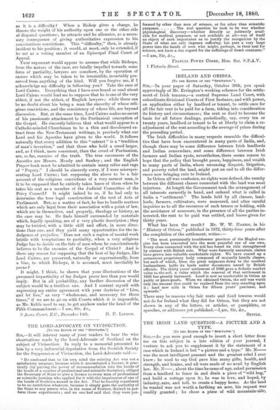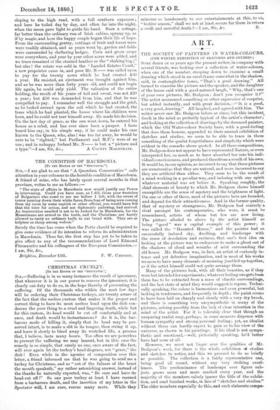THE IRISH LAND QUESTION—A PICTURE AND A TYPE.
go THE EDITOR OF THE .4 SPECTATOR.") Sin,—As you were good enough to insert a short letter from me on this subject in a late edition of your journal, I venture to ask you to supplement it by the statement of a case which in Ireland is but " a picture and a type." Mr. N— was the most intelligent peasant and the greatest rebel I ever knew ; he used to say God gave him many gifts, health, and strength, and brains, and all were made of no avail by English law. Mr. N—, about the time he came of age, asked permission from a landlord to fence in and drain a piece of " wild bog," and build a cottage upon it ; he was in love, and hoped, by industry, care, and toil, to create a happy home. As the land he wanted was not worth a farthing an acre, his request was readily granted ; he chose a piece of wild mountain-side,
sloping to the high road, with a full southern exposure ; and here he toiled day by day, and often far into the night, when the moon gave light to guide his hand. Soon a cottage, far better than the ordinary run of Irish cabins, sprang up, as if by magic, and here the happy couple began their life of hope. From the surrounding gentry, cuttings of fruit and forest trees were readily obtained, and as years went by, garden and fields were surrounded by sheltering hedges. Corn and green crops were everywhere, and year by year other acres were added, and no trace remained of the stunted heather or the " shaking bog ;" but alas ! the estate was sold in the " Landed Estates Court," a new proprietor came in, and poor Mr. N— was called upon to pay for the twenty acres which he had created 230 a year. He resisted, an ejectment was brought against him, and as he was more than forty years old, and could not begin life again, he could only yield. The valuation of the entire holding, the result of his years of toil and sweat, was not 220 a year ; but 230 was demanded from him, and that he was compelled to pay. I remember well the struggle and the grief, as he looked around upon the soil which he had created, the trees which he had planted, the house where his children were born, and he could not tear himself away. He made his decision. 'Oa the last day of grace, as the sun went down, he entered his house as a rebel, and has ever since been a pauper. I have heard him say, in his simple way, if he could make his case known to the Queen, who, alas ! was too far away, he would be sure to be " righted," but Parliament and M.P.'s were of no use ; and in unhappy Ireland Mr. N— is but a " picture and







































 Previous page
Previous page